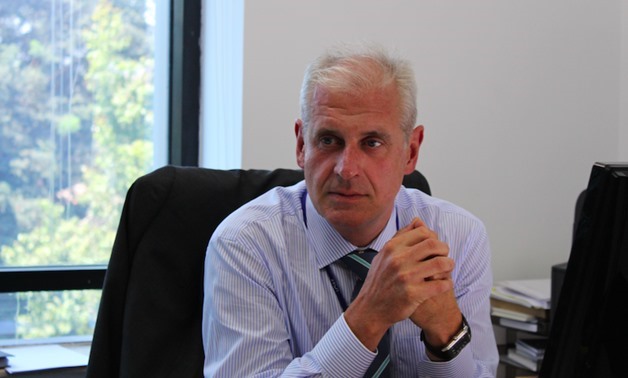
Mr. Laurent De Boeck, IOM Egypt's Chief of Mission - Courtesy of IOM
CAIRO – 13 February 2019: Despite an international backlash towards migrants, Egypt remains a safe zone for migrants, explains IOM Egypt’s Chief of Mission, Mr. Laurent De Boeck, in an interview with Egypt Today.
Although there has been an international wave against immigrants, statistically speaking, as a wide-array of research has shown, immigrants have a positive effect on the gross domestic product (GDP). Syrian businessmen and women in Egypt contributed $6 billion to GDP between 2015 and 2018, according De Boeck and the IOM’s 2018 paper. The paper also added that only 8,771 migrants registered for support during their stay in the country in 2018, meaning most immigrants reaching Egypt do not actually need financial aid form the state. Still, the IOM helps plenty of individuals return voluntarily to their home country, and run programs to ensure that immigrants and individuals from the host country get along.
When asked about the media’s responsibility in showing the public the positive role of migrants and how they contribute positively to society, De Boeck replied, “The media certainly has an important role in informing the people at various levels.”
He went on to explain that it is the role of the media to ensure that the people understand that migrants are part of the society and that migration creates society, and leads to diversity. This also has a positive impact on society.
“Migrants have a positive part of any society, they create the diversity in a society,” the IOM Chief said, adding that Egypt is a nice model because it is a cross point, and there are many different nationalities and cultures that have come to Egypt and have affected the culture.
“This is something that [the media] needs to remind the people of.” Migrants are not a burden to the society, he explained, they are a contributor to the way of thinking and the way if existence and co-existence.
“We will look at, and certainly look, to the Media to pass accurate information on who the migrants are, what they contribute to society, what they do positively and we try to repeat and see the positive effects of the migrants.”
It is also important to remember that there is quite a significant number of Egyptians abroad, about 9 million, which is equivalent to just under 10 percent of the Egyptian population. “Approximately 10 percent of the population lives outside the country, and the look for also divers societies where they are welcome and there are no social tensions. And if they integrate positively, they continuing having a link with their country of origin,” De Boeck tells Egypt Today.
“Egypt is a model in the world for that because it is among the top five companies in terms of remittances. So, they are returning back money that has an effect on the economy and the family circle because it allows them to have direct access to cash,” De Boeck explained, arguing that this is also showing that migration is positive.
Running the numbers
Although estimations place the number of migrants residing within Egypt to be around five million, the United Nation’s International Organization for Immigration (IOM) suggests that this number is well below the actual amount. “It is estimated that Egypt hosts about four million undocumented Sudanese nationals, who live in Egypt for several years, about one million Syrians (including businesspersons), one million Libyans who work in the country for decades, and many Iraqis and Lebanese migrants,” stated the IOM in a 2018 report. This is not to mention those who have been living her for more than one generation, meaning that they have expanded their families and made Egypt their home, explains De Boeck.

Comments
Leave a Comment